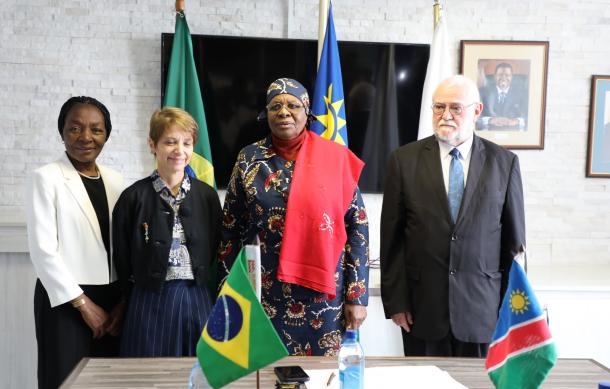
Namibia will have the ability to fully meet its local food consumption demand by 2030.
The Minister of International Relations and Cooperation, Netumbo Nandi-Ndaitwah, said this when she received a donation of N$2,2 million from the government of Brazil.The funds will complement the government's efforts to end hunger by 2030 through livelihood projects.
The fund, which is administered through the World Food Programme, aims to upscale the implementation of five 'Food System Projects' across the country.
International Relations and Cooperation Minister Netumbo Nandi-Ndaitwah said the WFP programmes empower the communities to produce their own food.
"One of the SDGs that we are paying special attention to is SDG 2, which is zero hunger, and it is on this path that we really appreciate discovering Brazil, who agreed with us to collaborate with us in the realisation of this specific SDG because Brazil is a country that has managed within a few years to switch from being a net importer of food to a net exporter of food, and we believe that through this collaboration Namibia will benefit a lot."
The Ambassador of the Federation of Brazil, Vivian Loss Sanmartin, says Brazil will continue to support Namibia in enhancing its food systems.
"In response to a request from the Namibian Government, we evolved to a second donation of financial resources in 2020, used to fund five community-based food systems projects aimed at helping marginalised communities fight hunger and malnutrition, improve their diets, build resilience against recurrent events such as droughts and floods, and promote local food value chains and job opportunities."
The Deputy Country Director of the World Food Programme, Ericah Shafuda, says the donation will complement national efforts in transforming rural livelihoods and creating employment opportunities among youth and women.
"The donation presents a unique opportunity to the Government of Namibia, supported by WFP, to upscale the Food Systems Projects while facilitating skills and knowledge transfer to target communities."
The Minister of Agriculture, Water, and Land Reform, Carl Schlettwein, said Brazil's gesture will improve the quality of lives of the people, encourage learning, and contribute to the national food security efforts.





